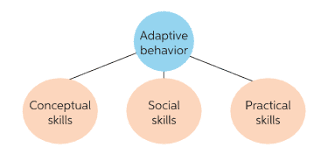Adaptive behavior is the ability to adjust to new situations and experiences, developing skills for successful living, as well as interpersonal interactions. This contrasts with maladaptive behavior, where a person develops a response to given situations or behaviors, but it causes problems, rather than generating constructive and useful techniques for dealing with life. It is possible to assess people at various ages to see how well they are acquiring life skills, and to determine if they need assistance or interventions.
This behavior is age appropriate, with people acquiring increasingly more complex skills as they get older. For very young children, adaptive behavior can include things like honing grasping abilities to reach objects, speaking to request assistance from adults, and identifying and avoiding dangers like power outlets. As people grow older, they pick up interpersonal communication techniques and start to develop living and learning skills like organizing homework, working, and so forth.
When people do not develop adaptive behavior in a timely fashion, it can be a sign of a learning disability or a cognitive disability making it difficult for the person to acquire and apply knowledge. Many people with learning disabilities have trouble with developing behaviors to help them learn, such as the ability to focus, complete homework, or interact with other students in a classroom environment. Intellectual disabilities like Down syndrome can interfere with the development of adaptive behavior by making it hard for people to learn skills and grasp increasingly complex concepts.
Parents may notice that children do not develop life skills on a regular timeline and teachers can also observe problems with adaptive behavior development. A developmental psychologist can assess a child, using a rubric and drawing upon observations from people around the child to determine whether the child is meeting developmental targets. Some children are naturally a little slower and may just need more time, while others may need interventions like an aide to help them learn skills, or medications to address chemical imbalances that make it hard for them to learn.
- Avoiding dangers like power outlets is an example of an adaptive behavior for young children.
- Down syndrome may interfere with the development of adaptive behavior.
- Abuse may cause some people to develop maladaptive behavior patterns.
- Adaptive behavior allows people to develop successful skills like responsibility and concentration.
- A child who experiences physical or emotional abuse may develop long-term behavioral and developmental problems.
- Parents may notice that children do not develop adaptive behavior skills on a regular timeline.
- Learning different hygiene skills can be an example of adaptive behavior.
Adults can develop maladaptive behavior patterns as a result of abuse and trauma. They can work with a psychologist or therapist to explore the origins of their behaviors and see if it is possible to modify them. Someone who tends to avoid conflict, for example, might work with a therapist on being assertive with people like supervisors and family members. Therapists can help people identify adaptive behaviors they want to learn and will work with their clients to undo previously learned behaviors and develop more appropriate skills. This can include physical, as well as psychological, therapy; a person who walks with a limp because of a stroke, for example, might work on learning to walk again.
Mary McMahon
Posted by Kids Are Special in CHILD DEVELOPMENT and BEHAVIOR
Enjoy relevant articles:
- The Child Behavior Difficulties You Have to Know About
- What does your child's behaviour mean?
- Age-Appropriate Chores for Kids Ages 2 to 18
- 8 Personality Traits of March-born Babies That Make Them Special
- Teaching Children Social Skills
- The Child Behavior Difficulties You Have to Know About
- 10 Signs That You Have A Strong-Willed Child
- The Activities a Baby Needs for Development

2 comments:
Very Nice Blog
Best Joint Pain Supplement
Best Immune Booster Supplement
Best Uric Acid Supplement
Best Sugar Free Chyawanprash
Best Cough Syrup
Hey Nice Blog!!! Thank you for sharing information. Wonderful blog & good post.Its really helpful for me, waiting for a more new post. Keep Blogging!!!
Occupational Therapy in Lucknow
Neuro Development Therapy in Lucknow
Post a Comment